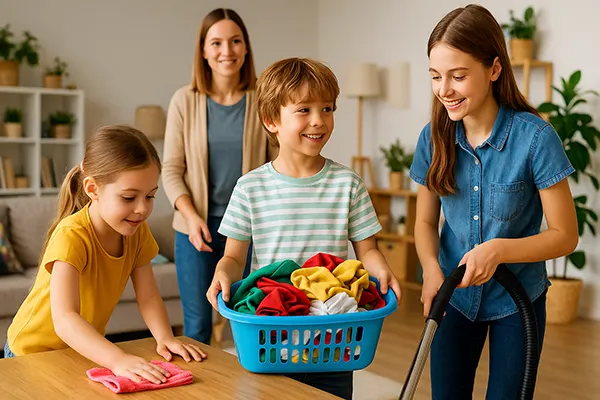
How to Teach Children to Help at Home: Age-Based Tips for Involving Kids in Household Chores
Getting children involved in household chores is more than just a way to lighten your load. It’s an important step in teaching responsibility, independence, and the value of teamwork. Encouraging children to take part in home tasks from an early age sets a foundation for strong life skills and helps build a sense of contribution and discipline.
Benefits of Assigning Chores to Children
Including children in daily household routines is a practical method of fostering growth and cooperation. When tasks are appropriate for their age, children not only develop valuable abilities but also gain confidence in their own competence. This experience becomes a crucial part of their social and emotional development.
Children feel a greater sense of belonging and connection when they contribute to their home environment. This creates positive associations with routine and teamwork, which can improve their behaviour and family relationships.
Teaching children to help with chores also reduces their dependence on adults, instilling a sense of responsibility and autonomy. With time, these habits shape disciplined, considerate individuals who value structure and order in their surroundings.
Psychological Perspective on Early Responsibility
Psychologists affirm that allowing children to assist at home increases their self-worth and resilience. Completing chores activates reward mechanisms in the brain, which reinforces positive behaviour. It also teaches problem-solving and time management skills when performed regularly.
Responsibility builds self-efficacy. Children learn that their actions have an impact, a realisation that influences their self-image positively. Even small achievements like making a bed or setting the table can be empowering.
Moreover, early involvement in family routines reduces entitlement and encourages gratitude. Children begin to appreciate the work involved in maintaining a household, developing empathy and a willingness to contribute.
Age-Appropriate Chores for Young Children
From as early as two years old, children can start contributing in small ways. At this stage, imitation is a powerful motivator, and they love copying adults. Encouraging simple tasks like putting toys away or helping to feed pets can be both fun and instructive.
Between ages 4 to 6, children can handle slightly more structured responsibilities. These may include wiping tables, matching socks from the laundry, watering plants, or helping set the dining table under supervision.
The goal isn’t perfection but consistency. Praise and encouragement are essential, helping children associate responsibility with positive feedback and satisfaction rather than criticism or pressure.
Creating a Chore Routine for Toddlers
Design a routine that involves repetitive and predictable tasks. Repetition is comforting and helps toddlers internalise patterns of responsibility. Use visual aids or chore charts with stickers to track their contributions.
Make chores a game whenever possible. Singing while cleaning, using colourful tools, or racing to finish a task can make the activity enjoyable. Playfulness increases participation and retention.
Always supervise and offer help when needed. Tasks at this stage should be quick and light. The focus is more on building a habit rather than achieving results. This lays a solid groundwork for future responsibility.

Involving School-Aged Children in Daily Responsibilities
By the time children reach school age, their cognitive and motor skills allow for more complex chores. They can sweep floors, fold clothes, pack their schoolbags, or help with meal preparation.
At this age, it’s useful to assign personal as well as family-related tasks. Children should take care of their own belongings and also contribute to general household upkeep. This builds a balance between personal accountability and collective responsibility.
Consistency remains key. Assign chores that fit into their daily schedule without overwhelming them. Too much responsibility too quickly can lead to resentment or burnout. Gradual progression is more effective.
Motivating Older Children Without Pressure
Use verbal recognition rather than material rewards. Saying “thank you” and acknowledging their effort is more effective in developing intrinsic motivation. Avoid creating a reward-based mindset for every completed task.
Offer choices to promote autonomy. Let them choose between two or three tasks to avoid resistance. A sense of control increases cooperation and motivation.
Regularly update their tasks as they grow. This keeps responsibilities age-appropriate and prevents chores from becoming monotonous. Variety keeps children engaged and learning new skills.
